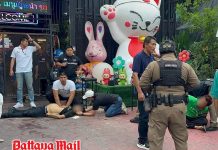
The new top concern of Pattaya expats, almost 60 percent, is the recent announcement of the Thai internal revenue service to tax all income brought into Thailand by both Thai nationals and farang residing here over 180 days in a calendar year. According to a straw poll of 150 expats (UK, US, EU, Australia), conducted in Jomtien soi five from 26-28 September, the subject has displaced visa and insurance concerns from their traditional first place in past polls.
“Touch my pension and I’m out of here, was the response of many expats. Some, mostly retirees, said they were reviewing their options such as moving to Cambodia or the Philippines where tax laws are believed to be softer or ignored for foreign residents. However, about a quarter of the respondents had never heard of the proposal or thought it did not apply to them. Five respondents thought it only referred to currency speculators, holders of off-shore accounts in Hong Kong or elsewhere or rich investors in overseas businesses.
Pattaya Mail contacted a Thai tax lawyer for his personal perspective. Here is his reply, “Thai revenue is simply updating an old law by saying that tax must be paid, from next year, on foreign income even if the incoming money’s arrival is delayed into a future tax year. But there is no intention to tax again income that has already been taxed abroad. For example, the pensions of most foreign retirees are taxed initially in their home country and there are, in any case, double taxation treaties with 61 countries. The issue is whether all resident expats will need to register with Thai revenue to obtain a tax identification number (TIN) to explain their individual circumstances. Nobody can answer detailed questions until the revenue issues more guidelines for the non-business community.”
Second subject choice for most respondents was concern that more long term visas would soon require compulsory hospital insurance. The prime worry was amongst the holders of non “O” retirement extensions or the annual extension granted to foreigners with a Thai spouse. There have been no official announcements, but remarks earlier in the year by a deputy national police chief, Surachate Hakparn, seem to be the main source of worry. Several respondents said they had now moved to Elite visas which guarantee multiple-entry to Thailand for 5-20 years depending on the initial cash sum paid, starting with 900,000 baht. The whole subject is controversial in Thai government circles as the evidence shows that most non-payment of hospital bills by foreigners arises from motorbike accidents involving short-term tourists under 40.
Other subjects of worry raised in the field study included the future of night life in the city which some see as short-term as the Pattaya tourist profile changes to Asia and away from Europe and the future of ganja leisure smoking in view of recent government announcements to restrict use to medical treatment. Brits are understandably upset by their “frozen” old age pensions here, although respondents seem resigned to the inevitability of discrimination. Four respondents primarily raised the issue of inflation in supermarket products, whilst three referred to traffic jams which they blamed on city hall or too many music festivals. A sole Australian expat said she was really worried about an influx of Americans if Donald Trump won the general election next year.






